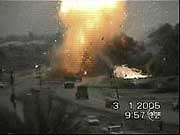|
Executive Summary
 Ever since the United States and an international coalition toppled Saddam
Hussein’s dictatorship in the spring of 2003, the Iraq war has dominated
network newscasts. Since then, there’s been a lot of undeniably bad news,
as terrorists have launched a savage campaign to thwart efforts to
establish democracy in a major Arab state. But are network reporters
giving the public an inordinately gloomy portrait of the situation, as
some critics charge? Are the positive accomplishments of U.S. soldiers and
Iraq’s new democratic leaders being lost in a news agenda dominated by
assassinations, car bombings and casualty reports?
Ever since the United States and an international coalition toppled Saddam
Hussein’s dictatorship in the spring of 2003, the Iraq war has dominated
network newscasts. Since then, there’s been a lot of undeniably bad news,
as terrorists have launched a savage campaign to thwart efforts to
establish democracy in a major Arab state. But are network reporters
giving the public an inordinately gloomy portrait of the situation, as
some critics charge? Are the positive accomplishments of U.S. soldiers and
Iraq’s new democratic leaders being lost in a news agenda dominated by
assassinations, car bombings and casualty reports?
The answer to both questions is: Yes.
This conclusion is based on a Media Research Center study of broadcast
network news coverage of the Iraq war so far this year. MRC analysts
reviewed all 1,388 Iraq stories broadcast on ABC’s World News Tonight, the
CBS Evening News and NBC Nightly News from January 1 through September 30.
(In 2006, the MRC will release a similar analysis of cable news coverage
of Iraq.) Among the key findings:
■ Network coverage
has been overwhelmingly pessimistic. More than half of all stories (848,
or 61%) focused on negative topics or presented a pessimistic analysis of
the situation, four times as many as featured U.S. or Iraqi achievements
or offered an optimistic assessment (just 211 stories, or 15%).
■ News about the war
has grown increasingly negative. In January and February, about a fifth of
all network stories (21%) struck a hopeful note, while just over half
presented a negative slant on the situation. By August and September,
positive stories had fallen to a measly seven percent and the percentage
of bad news stories swelled to 73 percent of all Iraq news, a ten-to-one
disparity.
■ Terrorist attacks
are the centerpiece of TV’s war news. Two out of every five network
evening news stories (564) featured car bombings, assassinations,
kidnappings or other attacks launched by the terrorists against the Iraqi
people or coalition forces, more than any other topic.
■ Even coverage of the Iraqi political process has been negative. More
stories (124) focused on shortcomings in Iraq’s political process — the
danger of bloodshed during the January elections, political infighting
among politicians, and fears that the new Iraqi constitution might spur
more civil strife — than found optimism in the Iraqi people’s historic
march to democracy (92 stories). One-third of those optimistic stories
(32) appeared on just two nights — January 30 and 31, just after Iraq’s
first successful elections.
■ Few stories focused on the heroism or generous actions of American
soldiers. Just eight stories were devoted to recounting episodes of
heroism or valor by U.S. troops, and another nine stories featured
instances when soldiers reached out to help the Iraqi people. In
contrast, 79 stories focused on allegations of combat mistakes or
outright misconduct on the part of U.S. military personnel.
■ It’s not as if there was no “good news” to report. NBC’s cameras found
a bullish stock market and a hiring boom in Baghdad’s business district,
ABC showcased the coalition’s successful effort to bring peace to a
Baghdad thoroughfare once branded “Death Street,” and CBS documented how
the one-time battleground of Sadr City is now quiet and citizens are
beginning to benefit from improved public services. Stories describing
U.S. and Iraqi achievements provided essential context to the
discouraging drumbeat of daily news, but were unfortunately just a small
sliver of TV’s Iraq news.
It is probably predictable
that journalists would emphasize bad news, but network TV’s profoundly
pessimistic coverage has shortchanged the accomplishments of both the U.S.
military and Iraq’s new leaders and has certainly contributed to the
public’s growing discontent with the war. Just as it would be wrong for
reporters to conceal any bad news, it is wrong for journalists to downplay
the good news that is being made in Iraq. Reporters have the
responsibility to fully inform citizens about progress that is being made
amid great sacrifice, and they are not doing so.

Home | News Division
| Bozell Columns | CyberAlerts
Media Reality Check | Notable Quotables | Contact
the MRC | Subscribe
|










 Ever since the United States and an international coalition toppled Saddam
Hussein’s dictatorship in the spring of 2003, the Iraq war has dominated
network newscasts. Since then, there’s been a lot of undeniably bad news,
as terrorists have launched a savage campaign to thwart efforts to
establish democracy in a major Arab state. But are network reporters
giving the public an inordinately gloomy portrait of the situation, as
some critics charge? Are the positive accomplishments of U.S. soldiers and
Iraq’s new democratic leaders being lost in a news agenda dominated by
assassinations, car bombings and casualty reports?
Ever since the United States and an international coalition toppled Saddam
Hussein’s dictatorship in the spring of 2003, the Iraq war has dominated
network newscasts. Since then, there’s been a lot of undeniably bad news,
as terrorists have launched a savage campaign to thwart efforts to
establish democracy in a major Arab state. But are network reporters
giving the public an inordinately gloomy portrait of the situation, as
some critics charge? Are the positive accomplishments of U.S. soldiers and
Iraq’s new democratic leaders being lost in a news agenda dominated by
assassinations, car bombings and casualty reports?